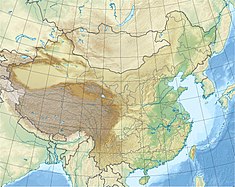Shuikou Dam
Appearance
(Redirected from ShuiKou Dam)
| Shuikou Dam | |
|---|---|
| Country | China |
| Location | Fujian Province |
| Coordinates | 26°18′11″N 118°48′43″E / 26.30306°N 118.81194°E |
| Status | Operational |
| Opening date | 1996 |
| Dam and spillways | |
| Type of dam | Concrete gravity |
| Impounds | Minjiang River |
| Height | 101 metres (331 ft) |
| Length | 783 metres (2,569 ft) |
| Spillway type | Service, controlled overflow flip-bucket |
| Reservoir | |
| Creates | Shuikou Reservoir |
| Total capacity | 2,600,000,000 cubic metres (2,107,854 acre⋅ft) |
| Catchment area | 52,438 square kilometres (20,246 sq mi) |
| Power Station | |
| Commission date | 1996 |
| Turbines | 7 x 200 MW Kaplan turbines |
| Installed capacity | 1,400 MW |
| Annual generation | 4950 GWh |
The Shuikou Dam is a concrete gravity dam on the Minjiang River in Fujian Province, China. The primary purpose of the dam is hydroelectric power generation and it supports a 1,400 MW power station with 7 x 200 MW Kaplan turbines. The dam also provides navigation with a 500-ton flight of 3 ship locks and a 500-ton ship lift.[1] Other purposes include flood control, irrigation and recreation.[2]
See also
[edit]References
[edit]- ^
"IMPLEMENTATION COMPLETION REPORT, CHINA, SECOND SHUIKOU HYDROELECTRIC PROJECT" (PDF). World Bank. 1999-02-17. Retrieved 2019-11-12.
Navigation facilities included in the scope of the first project were a three flight ship-lock to accommodate two 500-ton ships and a raft lift to accommodate a 10.5m x 64m x lm timber and bamboo raft. The transportation capacity of the ship-lock was estimated at 3.2 million tons per year, while that of the raft-lift was 1.6 million m3 per year. By the time of the appraisal of the second loan in mid-1991, FPEPB had decided to upgrade these facilities to convert the raft lift to a vertical ship-lift which could also accommodate two 500-ton ships at the same time. The ship-lift was therefore included in the additional scope of the second project.
- ^ "Shuikou" (PDF). Chinese National Committee on Large Dams. Retrieved 4 January 2011.
The project consists of concrete gravity dam, powerhouse, 220 kV switch station, 500 kV substation, one-way three-steps ship lock that can accommodate two 500-t barge and ship lift. Its main function is power generation, incorporated with navigation, flood control, irrigation and tourism.

